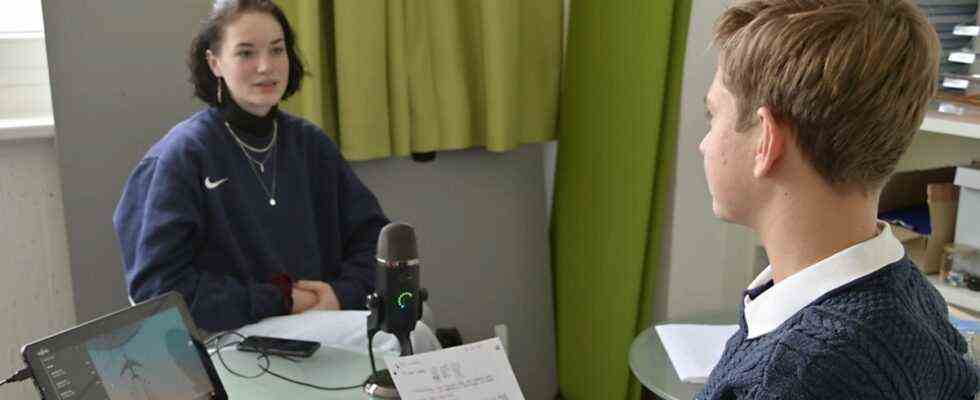Friday afternoon, 1.30 p.m. in the Neubiberg grammar school: in the midst of the whirlwind of homework supervision, ten of the 1,400 students looked for a quiet corner. While fifth graders are doing gymnastics on colorful seating and longing for the weekend, the twelfth graders are producing podcasts.
And that with great success: They have already published over 20 episodes under the title “RadioGN” on Spotify and Apple Music. “This is the best seminar I’ve ever supervised,” says teacher Tobias Briegel, who offered the initiative as a project seminar. Briegel is not in charge, he values it. It offers the students the space to put their ideas into action. Literally: Briegel unlocks a small staff room for them, then says goodbye. Once a week he listens to what the students have to say. Every now and then Briegel gives feedback, but even that is short. The group motivates each other, pushes a lot of overtime and voluntarily stays longer in the school building.
In the upper level, high school students in Bavaria take two seminars that are intended to facilitate the transition from school to study and work. The design is left to the teachers and the students can freely choose their seminars. The work in the courses is graded and is included in the Abitur grade. The Neubiberger Podcast Seminar is offered as a business course. In addition to journalistic work, it is also about marketing.
Laura wrote an audio book, it’s 100 pages long
Numerous episodes are currently in the works, with production starting several weeks in advance. While two are reviewing the general election, the others are working on the catalog of questions for an entertainment format with two art teachers and are planning a large special edition at the same time: student Laura Krammer has written an audio book. She put 100 pages on paper during the summer holidays, now roles are assigned and sound effects are discussed.
Bundestag elections, quizzes and audio books – the podcasts deal with a wide variety of topics in different ways. The students have a free hand in choosing a topic and implementing it. Regardless of whether it is about choosing the right language course, trading securities or Formula 1.
Interest is only low in the intermediate level
In production, they also learn how to use audio editing programs and everyone was already at the microphone. The group faces a particular challenge in preparation, as most of the listeners come from either the lower or upper grades. In the middle school, most of the classmates are not interested. But how do you explain the system of government to a fifth grader without boring the high school graduate? “Getting the Federal Council declared is not so bad for the elderly either,” says Lilo Schick. She wants social studies teachers to be able to use the podcast in class and parents to overhear the little ones.
The podcast team is a colorful mix; almost all of them only knew each other by sight beforehand. And almost all of them have plans for the time after their Abitur that couldn’t be more different: The career aspirations range from a doctor to a police officer, from an electrical engineer to a sports journalist.
Before they leave school next spring, they want to pass the project on to the next generation. You are looking for a teacher who always brings new students into the editorial office. “Otherwise it will end like the school newspaper,” warns Nils Aust. The last edition was published in 2019. Since the coronavirus banned the articles on the website, the range has been dwindling. It would be nice to have created a medium that has been retained in the school, says Aust, “and it is also well received”. Nevertheless, “RadioGN” remains a beacon project in search of a mentor and a new editorial team. Next summer will decide whether the Neubiberg high school will continue to publish student podcasts. Because the team from Q12 already has the high school diplomas in their pockets.

